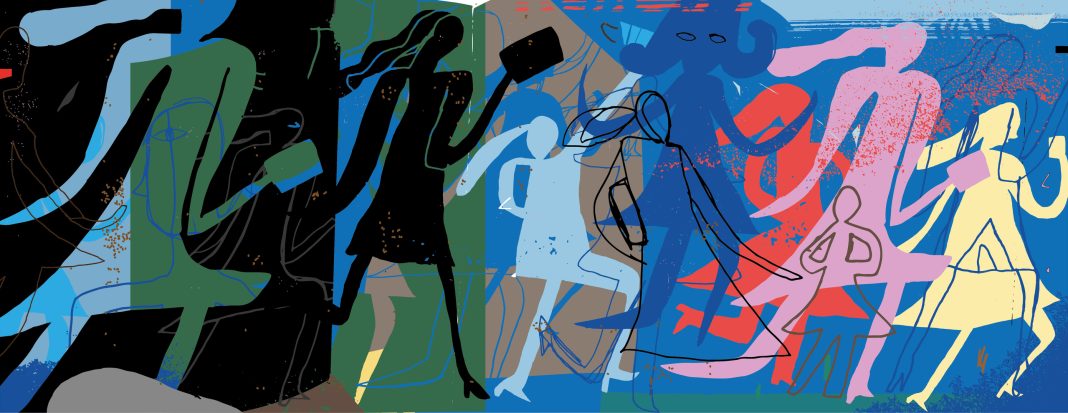Dr Claudia Mitchell, Director of the Participatory Cultures Lab, Department of Integrated Studies in Education (DISE). McGill University, tells us about the TRANSFORM project aimed at disrupting harmful gender norms and mobilizing for social change
Gender inequalities and discrimination persist glaringly around the globe. Gender-based violence stands out as one of the most widespread human rights violations. Forced and early marriage and female genital mutilation also continue to have an impact on the lives of young people. The United Nations has identified transforming harmful gender norms as a critical goal among its 17 Sustainable Development Goals for 2030.
Young people and gender equality
Young people can play a key role in local and transnational work to address gender equality. This need for urgent action is driving a vital multiyear project, TRANSFORM: Engaging with Young People for Social Change. The project is funded by the Social Sciences and Humanities Research Council of Canada (SSHRC). It brings together 40 researchers, 16 universities (including 19 centres, labs, studios and institutes), ten partner organizations (national and international NGOs, policy actors, and publishers) (1) with hundreds of young people from around the world. The project is led by Claudia Mitchell (McGill University), Relebohile Moletsane (University of KwaZulu-Natal), Shannon Walsh (University of British Columbia), and Lisa Starr (University of Lethbridge). At the core of TRANSFORM lies the concept of gender transformation, a radical approach aimed at disrupting gender norms and dismantling unequal gender dynamics to mobilize for social change. Gender transformation serves as a guiding framework for feminist practices in global engagements (UN Women, 2022). The concept of gender transformation, however, is understudied, particularly in real-world implementation contexts. (See MacArthur et al, 2022).
What is needed to disrupt harmful gender norms?
TRANSFORM is addressing this pressing question by supporting youth-led interventions to study how young people experience, envision, and enact gender transformation at field sites in Africa (Nigeria, Sierra Leone, South Africa), Latin America (Argentina, Mexico), and South Asia (India). Using diverse art forms from photography, filmmaking, and cellphilming to performance art and textile production, TRANSFORM’s participants are exploring gender norms in relation to issues that are important to young people, such as climate justice, queer activism, forced and early marriage, and gender-based violence. A key feature of TRANSFORM is its ‘partnership of partnerships’ approach, building on pre-existing fieldwork (Mitchell & Moletsane, 2018), as well as new fieldwork and, in so doing, supports a learning across projects agenda, longitudinality, and what Walsh et al. (2022) refer to as learning ‘over time.’

Case study: Picturing gender transformation: Young teachers in Sierra Leone as agents of change
New teachers, many of them young people themselves, can play important roles as agents of gender-transformative social change in their communities. One of TRANSFORM’S field sites involves preservice teachers and instructors from six teacher training colleges in Sierra Leone. So far, the participants have engaged in participatory visual workshops over several months where they have created drawings and cellphilms (short films made on a cellphone or iPads) about critical issues related to disrupting harmful gender norms, including forced and early marriage and sexual violence in classrooms. The fieldwork demonstrates the key role that young men, alongside young women, can play as allies and champions for gender transformation. As a special ‘taking action’ feature of the fieldwork, young people also circulated their cellphilms through a WhatsApp platform, and beyond the workshops, are continuing to produce new cellphilms and even train other young people on cellphilm production, including the ethics of cellphilm production and knowledge mobilization.
This work is represented in a documentary film produced by CODE, Teachers Taking Action in Sierra Leone: Cellphilming for Social Change, which tells the story of how teachers from the six teacher training institutes across Sierra Leone are using cellphilming as a tool for addressing gender issues in their colleges and communities. The film introduces cellphilming as a participatory visual approach to engagement in gender transformation. It features preservice teachers and teacher educators along with NGO community educators who are working with cellphilming for the first time. Teachers Taking Action showcases youth-produced cellphilms such as ‘She’s too young’ tackling early marriage and the voices of young women and young men about making change in their community.
The documentary was filmed during cellphilm workshops that took place in Magburaka, Sierra Leone. (See also Mitchell et al., 2024).

Footnote
- Agenda, Berghahn Book, Code, Equitas, Oxfam Canada, Plan Canada, Right to Play, UNESCO International Institute for Higher Education in Latin America & the Caribbean (IESALC) , Uthingo, Women and Gender Equality Canada (WAGE)
References
- MacArthur, J., Carrard, N., Davila, F., Grant, M., Megaw, T., Willetts, J., & Winterford, K. (2022). Gender- transformative approaches in international development: A brief history and five uniting principles. Women’s Studies International Forum, 95(102635).
- Mitchell, C. Thompson, J. & Starr, L. (2024) Re-visioning as practice in cellphilming in Sierra Leone: A reflexive account of addressing gender-transformation in the moment In C. Mitchell, S.M.H. Sadati, L. Starr & Roy, C. (eds). Revisioning cellphilming methodology. Springer
- Mitchell, C., & Moletsane, R. (Eds.) (2018). Disrupting shameful legacies: Girls and young women speak back through the arts to address sexual violence. Brill/ Sense.
- UNWomen. (2022). Feminist Foreign Policies: An Introduction. https://www.unwomen.org/sites/default/files/2022-09/Brief-Feminist-foreign-policies-en_0.pdf
- Walsh, S., Mitchell, C., & Oliphant, M. (2022). In my life: Stories of youth activists in South Africa, 2002-2022. Jacana Press

This work is licensed under Creative Commons Attribution-NonCommercial-NoDerivatives 4.0 International.


